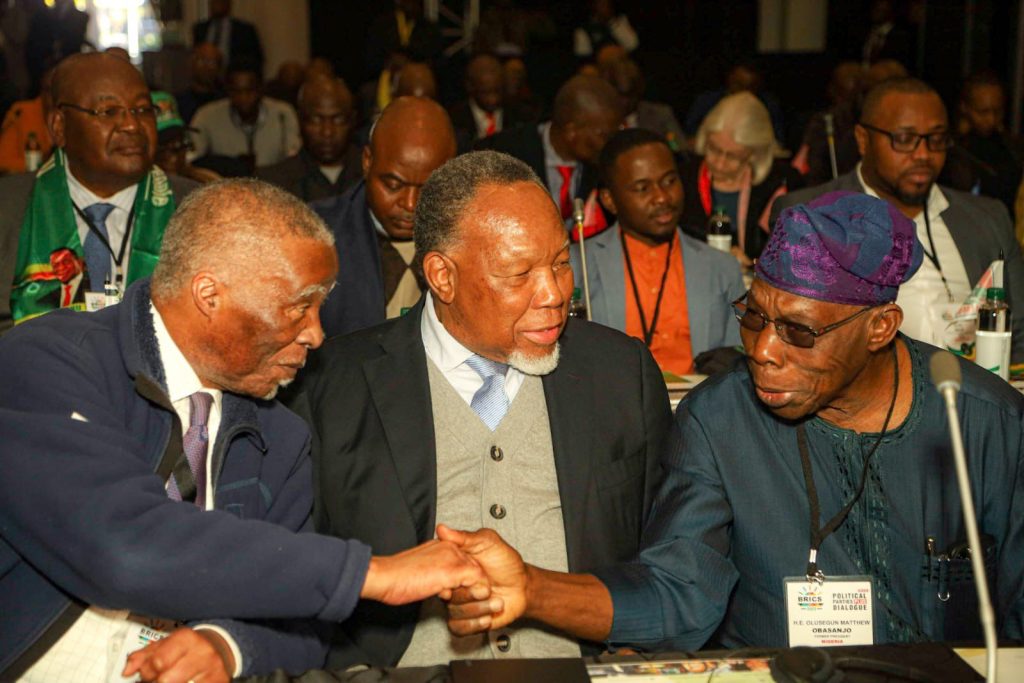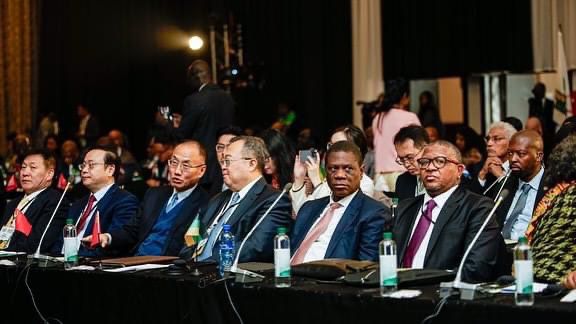Mthobeli Jiwulane
Multilateralism received a boost when political parties within the Brazil, Russia, India, Chinas and South Africa (BRICS) forum adopted a declaration committing to greater inclusivity in the world, accelerated growth and sustainable development.
They also committed to resolving tensions and conflicts peacefully to sustain peace and stability and supported BRICS efforts to find solution to the Ukraine conflict by encouraging dialogue and diplomacy. China and South Africa which worked under the African Peace Initiative with five other countries, were currently involved in effort to find a peaceful resolution of the current conflict between Russia and Ukraine.
The parties from 45 countries within BRICS and beyond participated in the BRICS Political Parties Plus Dialogue held at Ekurhuleni, South Africa from July 18-20. The dialogue’s theme was, ‘BRICS and Africa: Partnership for Mutually Accelerated Growth, Sustainable Development, and Inclusive Multilateralism’

The parties, which came from Asia, Middle East, Africa and Latin America, agreed that BRICS countries and the global South should seek to diversify and transform the international financial architecture. This entailed working towards greater inclusivity and equity, including through the New Development Bank (NDB) and encouraging more local currencies financing.
“We will continue to champion the transformation of the Bretton Woods Institutions,” the declaration said.
The idea of the use of the local currencies for trade and to finance projects centred around de-dollarization world trade, which could subsequently undermine the US economic dominance. It involved dropping the US dollar in favour of local currencies when countries trade with one another.
The US Dollar had been the currency of world trade but the last few years had seen a move away from the greenback by some countries with BRICS the latest to join the fray.
The de-dollarization is set to gain momentum as more countries pledged their desire to join BRICS, which was currently working on modalities and principles to enable for the its expansion. At the conclusion of the process, BRICS, established in 2011, was set to become the largest multilateral regional body considering that a third of the world population reside within the BRICS countries.
It could undermine the political dominance of the G7 comprising the highly industrialised nations of Canada, France, Germany, Italy, Japan, the United Kingdom and the United States. With China as the second biggest economy in the world and the rich Middle East oil-producers such as Saudi Arabia, Iran, United Arab Emirates, among others having applied to become BRICS members, the forum was bound become the world’s economic behemoth.
The dialogue coincided with the global Nelson Mandela International Day, his birthday.

Mandela championed multilateralism and often clashed with the United States for acting unilaterally to use its military might to invade other countries and thereby undermining the UN’s role to ensure peace and stability in the world.
Mandela was born on 18 July, was declared an international day by the United Nations in recognition of the late freedom fighter’s struggle for freedom and justice and an end to white racist apartheid rule in South Africa. He was incarcerated for 27 years and released on 11 February 1990 and was four years later elected as the first black and democratic president of South Africa.
The parties believe the way to multilateralism was opened and the current geopolitical conflicts were due to a shift from unipolar to a multipolar world order.
“We held the Dialogue in a context of ongoing shifts in the geopolitical landscape, with accelerated movement towards a multipolar world in which countries of the global South are increasingly asserting themselves and their interests on the global stage. We also convened in the context of new and emerging threats to international peace and security,” the declaration said.
The declaration, which was read by Nomvula Mokonyane, deputy secretary-general of the ruling African National Congress in South Africa, voiced the urgent need for the transformation of the Bretton Woods institutions – the International Monetary Fund and the World Bank. They would encourage the BRICS New Development Bank to play a greater role among the developing countries.
The NDB, based in Shanghai, China, is threatening the dominance of the Washington-based World Bank and IMF as international lenders.
It’s believe either NDB’s existence would cause an “economic cold war” between the East and the West or force some concessions by the Bretton Woods Institutions on their notorious loan conditionalities. The institution made loaning countries to adopt neo-liberal economic policies and Western-styled democracy as conditions for extending loans to them.
The political parties believed they should political responsibility to lead the way, build consensus, promote development and participatory democracy, boost engagement, encourage investments, strengthen cooperation and improve governance in their respective countries. Some BRICS member states including a large number of aspirant members lagged behind on democracy with injustice continued to be meted out against political opponents.
Another aspect of multilateralism adopted was the reaffirmation by the parties to a world of peace and stability by continuing to support the central role of the United Nations. They wanted UN Charter’s principles to be respected and for and equitable application of international law, an apparent reference to the selective prosecutions by the International Criminal Court (ICC).
The developing countries claimed the West abused the UN and the ICC for their hegemonic imperial objectives particularly by the US. They objected that US, while not a member of the ICC did not qualify to call the prosecution of other countries’ heads of state for crimes against humanity. They always raised the invasions of Iraq, Afghanistan, Libya and Yemen, among others, as cases where the US acted with impunity when it should have been charged for crimes against humanity by the ICC.
African countries also accused the ICC of targeting African countries for prosecution while it ignored atrocities committed by the western countries.
“We remain committed to resolving tensions and conflicts in a manner that addresses their root causes, in order to sustain peace and stability in our various regions, and across the world. We thus welcome efforts by BRICS countries and their partners to find a viable and durable solution to the conflict in Ukraine in a manner that encourages dialogue and diplomacy,” the parties declared.
They resolved to advocate against interference in the internal affairs of countries and for sovereignty, territorial integrity and dignity of all nations to be respected. They wanted to see inclusive and mutual security to be the guiding principles for international relations.
“We support the right of countries to independently choose development paths and social systems, working together in their national interests. We believe that political parties should commit to strengthening multilateralism, the transformation of global institutions and upholding international law,” the parties said.
They also cooperate to build consensus among political parties and to promote BRICS cooperation including expanding the BRICS Political Parties Plus Dialogue.
The developmental growth of Africa was discussed were synergies between the United Nations Sustainable Development Goals and the African Union’s Agenda 2063 and the implementation of Agenda 2063 were explored.
According to the parties the implementation of the African Continental Free Trade Area (AFCFTA) provided a greater opportunity to enhance the development of industrial capacity, infrastructure and regional value chains across Africa. This would boost the continent’s manufacturing capacity, ensure secured supply chains, economic resilience and intra-Africa trade.
“BRICS countries can play a catalytic role in supporting Africa’s development priorities. We therefore support the strengthening of the BRICS-Africa cooperation,” the parties said.
The dialogue participants committed to addressing terrorism, corruption and natural resource mismanagement in their respective countries. They said these contributed to instability in the affected countries.
They called for the all parties to honour and implement all UN and UN Security Council resolutions including Resolution 2334 for resolving the Israeli-Palestinian question. In this case they supported the two-state solution involving the creation of an independent Palestine state with East Jerusalem as its capital and for the Palestinians to live side by side with Israelis.
On the same vein, the parties called for the implementation of the UN Resolution 1514 for resolving the Saharawi question in Western Sahara. They welcomed the direct talks between the Saharawi and Moroccans under the UN supervision.
“Our commitment to these ideals is informed by the imperative to ensure an improving quality of life among the people in our countries and across the globe. We therefore urge governments to implement programmes that promote this ideal,” the parties said.


